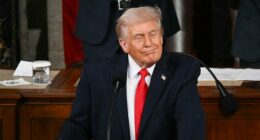Share this @internewscast.com

A bipartisan initiative aimed at imposing stringent sanctions on Russia has garnered the backing of over 80 Senate cosponsors. However, unlike during President Trump’s initial term, Senate Republicans are hesitant to advance the bill without Trump’s approval. So far, Trump hasn’t signaled his endorsement to the GOP lawmakers.
This move by Senate Republicans to await Trump’s nod on Russia sanctions marks a significant departure from behavior observed during Trump’s first term. At that time, Congress was proactive in penalizing Russia, often sidelining Trump’s hesitations.
Currently, Trump wields greater control over the Republican Party. Those Senate Republicans who previously held substantial sway over foreign policy discussions in Congress eight years ago are no longer in the picture.
GOP senators say they’re ready to slap heavy sanctions on Russia and countries that buy its products, but they want Trump to lead the way — in contrast to his first term, when leading Republicans viewed Trump as a foreign policy neophyte.
“If the White House concludes that tougher sanctions are in order, we’re here for it. We’ve got a bill ready to go that has an overwhelming bipartisan majority of senators on it,” Senate Majority Leader John Thune (R-S.D.) told reporters before the Memorial Day recess.
He made it clear, however, that Senate Republicans would not move without Trump, saying Republicans would “try and work with the administration” on sanctions legislation.
Thune reiterated that message on the Senate floor Thursday, arguing that “now the ball is in [Russian President Vladimir] Putin’s court.”
“If Russia is not willing to engage in serious diplomacy, the Senate will work with the Trump administration to consider additional sanctions to force Putin to start negotiating,” he said.
Sen. Markwayne Mullin (R-Okla.) says senators are “holding off” on moving sanctions legislation at Trump’s request, but predicted it would pass quickly if Trump signals he’s finished trying to broker a deal between Putin and Ukrainian President Volodymyr Zelensky.
“We’ve been holding off because President Trump wanted time to negotiate with Russia,” Mullin, who has worked on sanctions legislation with Sen. Lindsey Graham (R-S.C.), the lead sponsor of the measure, told Fox News’s Sean Hannity Tuesday.
He said that as soon as Trump gives senators the go-ahead, “we’ll be able to pass this in the Senate, we’ll be able to pass this in the House, and President Trump will sign it,” he said.
Some Republicans have tried to ramp up the pressure on Trump to take a harder line with Putin.
Sen. Chuck Grassley (R-Iowa), the Senate’s president pro tempore, pushed Trump Tuesday to let Putin know it’s “game over.”
“I believe president Trump was sincere when he thought his friendship w Putin wld end the war. Now that being the case ITS TIME FOR SANCTIONS STRONG ENUF SO PUTIN KNOWS ‘game over,’” Grassley posted on the social media platform X.
Trump on Wednesday asked for more time to feel out Putin’s willingness to strike a deal.
“We’ll find out whether or not he’s tapping us along or not and if he is, we’ll respond a little bit differently but it will take about a week and a half to two weeks,” Trump told reporters at the White House Wednesday.
The president’s efforts to broker a peace deal have dragged on for months with little progress to show.
His comments Wednesday came over the backdrop of a massive weekend bombardment of Ukrainian cities by Moscow.
Trump has at times appeared to lose patience with Putin — including chastising him for the weekend strikes — but nevertheless is keeping Republican lawmakers in a holding pattern.
Russian and Ukrainian negotiators are scheduled to meet in Istanbul Monday for another round of talks, where they are expected to present memos detailing their conditions for a peace deal.
The current political dynamic represents a shift from Trump’s first year in office in 2017 when the Republican-controlled Senate and House overwhelmingly passed sanctions legislation against Russia — and other foreign adversaries including Iran and North Korea — despite Trump’s strong objections.
Trump had little choice but to sign the Countering America’s Adversaries Through Sanction Act in August 2017 after it passed the Senate 98-2 and the House 419-3, reflecting huge veto-proof majorities in both chambers.
Trump complained in his signing statement at the time that the legislation was “seriously flawed” because he said it “encroaches on the executive branch’s authority to negotiate.”
“The dynamic is certainly inverted for this administration. In 2017, we saw Congress pass overwhelmingly the Countering America’s Adversaries Through Sanctions Act on a bipartisan basis. And the reason for this was concern that Trump at that point would make serious concessions to America’s adversaries,” said Benjamin L. Schmitt, senior fellow at the University of Pennsylvania’s Perry World House and Kleinman Center for Energy Policy.
Eight years ago, he said, “Congress was taking its Article I role very seriously to lead our foreign policy decision-making and make sure that there were not decisions made that would undermine our national security and foreign policy objectives.”
But he said the dynamic between the Trump White House and the GOP-controlled Congress is substantially different eight years later.
“You see that with Trump’s second term, Congress has been much less willing to lead,” Schmitt said.
In 2017, there were several Republican senators who were openly skeptical or critical of Trump in positions of influence.
Sen. Bob Corker (R-Tenn.) was the chairman of the Senate Foreign Relations Committee and Sen. Jeff Flake (R-Ariz.), another Trump critic, was a senior member of the panel.
And Sen. John McCain (R-Ariz.), an outspoken Russia hawk, still wielded a lot of power as chairman of the Senate Armed Services Committee.
Corker and Flake retired from the Senate in 2018 after it became increasingly clear they were out of step with the GOP’s gravitation toward Trump.
McCain died in August of 2018.
The current chairs of the Senate’s Foreign Relations Committee and Armed Services Committee, Sens. Jim Risch (R-Idaho) and Roger Wicker (R-Miss.), have shown less willingness to break with Trump — or pressure the Trump administration — than their predecessors.
Another key difference between 2017 and now is that Sen. Mitch McConnell (R-Ky.) was Senate majority leader at the time.
McConnell called out Putin as “a thug” in February of 2017 after Trump, who was newly sworn in as president, suggested a moral equivalency between the United States and Russia on the subject of extrajudicial killings.
“Not only are leadership positions across the Senate effectively a lot less willing to speak out and put pressure on the Trump administration itself to do more to support Ukraine … you also have different dynamics within the administrations,” Schmitt said.
“In the first Trump administration, you had a much more I would say traditionalist, internationalist group of Republicans that was in and around Trump when it comes to foreign policy decision-making and national security decision-making. You don’t have that now,” he said.
Trump’s first Cabinet, which included Vice President Mike Pence, Secretary of Defense James Mattis and White House chief of staff John Kelly, was also viewed as far more hawkish on Russian than his present-day team.
One Senate Republican aide said “there’s a different set of actors this time around,” both in Congress and the administration.
Eleven Senate Republicans voted for a bipartisan resolution in January of 2019 to rebuke the Trump administration for relaxing sanctions against companies linked to Russian oligarch Oleg Deripaska, a close Putin ally.
The House voted overwhelmingly that month to stop the Trump administration from lifting the sanctions, 362 to 53, sending a stern message across Pennsylvania Avenue.










